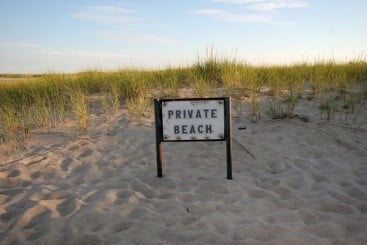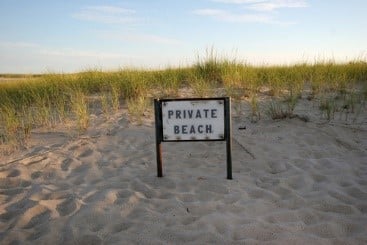One of the many perks of living in the Sunshine State is our beaches. Access to the ocean is often from a public park and has long been viewed as a public amenity and free natural resource for both residents and visitors. Questions about the assumption of public access arise, however, when reaching the coastline involves crossing private property.
 Earlier in 2018, the Florida Legislature passed House Bill 631, a new law which went into effect July 1, 2018. The law was created to resolve disputes between owners of private oceanfront land and local governments by creating a streamlined standard to clarify possession of real property.
Earlier in 2018, the Florida Legislature passed House Bill 631, a new law which went into effect July 1, 2018. The law was created to resolve disputes between owners of private oceanfront land and local governments by creating a streamlined standard to clarify possession of real property.
It is estimated that 60 percent of Florida’s beaches are privately owned. Florida lawmakers weighed the need to protect the public’s ability to enjoy its coastlines for recreational use against protecting the rights of private oceanfront property owners.
Some people were afraid the law would immediately cut off public access to beaches all over the State, but that is not the case. The intent was to establish a simple and equitable process by which a government entity may seek the judicial determination of recreational customary use of private beach property. That determination allows due process for the private property owners and notice and public hearings to all interested parties.
When speaking of beach access, the term “customary-use” refers to a general right of the public at large to possess and use certain dry sand areas for recreational purposes. Where a customary use of a dry sand area is shown, the property owner may not use traditional causes of action like ejectment, forcible entry or trespass to stop such public use of the private land.
In Trepanies v. County of Volusia, 965 So. 2d 276 (Fla. 5th DCA 2007), the Fifth District ruled that if a specific piece of beach property has historically been used by the public for recreational purposes, then a private landowner who owns that beach property cannot keep the public from accessing that beach. Trepanies followed a Florida Supreme Court decision which originally established the doctrine of recreational customary use for beach property. City of Daytona Beach v. Tona-Rama, Inc., 294 So. 2d73 (Fla. 1974).
Section 163.035, Fla. Stat., created by HB631, outlines limitations and prevents local governments from declaring Florida beaches on private property accessible to the public without the local government first obtaining a court declaration that the property meets four established criteria of customary use. The public’s recreational use of a specific piece of beach property must have been ancient, reasonable, without interruption, and free from dispute.
The law was found to be necessary after some local governments proposed or passed ordinances declaring certain private property to be accessible to the public under the doctrine of recreational customary use. This created conflict with private landowners. In response, the Florida Legislature passed Section 163.035(2), which flips the burden of going to court from the landowner to the governmental entity. The statute prohibits local governments from adopting such ordinances without first filing an action in court and successfully obtaining a judicial declaration that a specific parcel of beach property meets all four criteria of recreational use. Moreover, Section 163.035 (3) specifies that before the local government can file an action in court seeking such a declaration, the local government must first do the following: adopt a formal notice of its intent to do so at a public hearing; list the specific parcel of property involved; identify each source of evidence the government entity intends to rely upon in court to prove customary use; and give each owner of affected property notice of the public hearing.
Once such an action is filed in court, the governmental entity must give notice to all affected landowners, who then have 45 days to intervene in the action. In the court proceeding, there is no presumption of customary use, and the governmental entity has the burden of proof.
Section 163.035 gives hotels, condominiums and private homeowners more control over the beachfront they own, all the way to the mean high-water line (the point where the sand gets wet). Despite the high concentration of oceanfront development in South Florida, we will not see a major impact nor will this new law affect current public beach access.
Disputes over the new law will vary by municipality and county along the coast. For example, most, if not all, of the beaches in Miami Beach are public. In contrast, the competing rights of public access and private property ownership are currently being disputed in Walton County in Florida’s Panhandle, where beachfront property owners sought to restrict the public's access and county officials said they could not.
In a state that runs on tourism and real estate development, travel industry stakeholders and beachfront homeowners have competing concerns. Supporters of the law contend that it acknowledges the need for public access, but requires local governments to establish it through a specific legal process. Opponents say the legal requirement burdens local governments. While Walton County is fighting the battle over beaches in court, other communities have chosen to ignore the disagreement over public use of private beachfronts until a conflict erupts and then resolve the clashes on a case-by-case basis.
Alessandra Stivelman, shareholder and partner at Eisinger Brown Lewis Frankel & Chaiet, P.A. is AV rated and focuses her practice on community association and real estate law. She can be reached at (954) 894-8000 x 304 or astivelman@eisingerlaw.com. Eisinger, Brown, Lewis, Frankel & Chaiet, P.A., is a full service Florida law firm focusing on community association law, real estate law, developer representation, commercial litigation and insurance law. Visit eisingerlaw.com.


